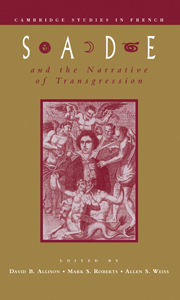Book contents
- Frontmatter
- Contents
- List of contributors
- Acknowledgments
- Introduction
- 1 The use value of D. A. F. Sade (An open letter to my current comrades)
- 2 Sade, or the philosopher–villain
- 3 Libidinal economy in Sade and Klossowski
- 4 A political minimalist
- 5 The Society of the Friends of Crime
- 6 Sade, mothers, and other women
- 7 The encyclopedia of excess
- 8 “Sex,” or, the misfortunes of literature
- 9 Structures of exchange, acts of transgression
- 10 Gender and narrative possibilities
- 11 Sade's literary space
- 12 Fantasizing Juliette
- Select bibliography
- Index
- Cambridge Studies in French
2 - Sade, or the philosopher–villain
Published online by Cambridge University Press: 21 August 2009
- Frontmatter
- Contents
- List of contributors
- Acknowledgments
- Introduction
- 1 The use value of D. A. F. Sade (An open letter to my current comrades)
- 2 Sade, or the philosopher–villain
- 3 Libidinal economy in Sade and Klossowski
- 4 A political minimalist
- 5 The Society of the Friends of Crime
- 6 Sade, mothers, and other women
- 7 The encyclopedia of excess
- 8 “Sex,” or, the misfortunes of literature
- 9 Structures of exchange, acts of transgression
- 10 Gender and narrative possibilities
- 11 Sade's literary space
- 12 Fantasizing Juliette
- Select bibliography
- Index
- Cambridge Studies in French
Summary
It shall be our task here to envision Sade's experience as it was conveyed in writing. First, we shall try to define the philosophical position he took, or made a pretense of taking, in his novels. The question shall be: What does thinking and writing – as opposed to feeling or acting – mean for Sade?
Sade himself, so as to definitively disavow authorship of his Justine, declares that all the “philosophers” in his “own” works are “decent people,” whereas “through an inexcusable clumsiness that was bound to set the author [of Justine] at loggerheads with wise men and fools alike,” “all the philosophical characters of this novel are villains to the core.”
The confrontation of the philosopher–decent–man with the philosopher–villain dates from Plato. The philosopher-gentleman sets forth the act of thinking as the sole valid activity of his being. The villain who philosophizes merely accords thought the value of favouring the activity of the strongest passion – which in the eyes of the gentleman is but a lack of being. If the summit of villainy consists in disguising one's passion as thought, the villain for his part finds in the thought of the gentleman nothing but the disguise of an impotent passion.
To do Sade justice, we should take this “villainous philosophy” seriously. Since it is set forth in such a voluminous work, it puts a sinister question-mark over the decision to think and to write – particularly to think through and to describe an act instead of committing it.
- Type
- Chapter
- Information
- Sade and the Narrative of Transgression , pp. 33 - 61Publisher: Cambridge University PressPrint publication year: 1995



